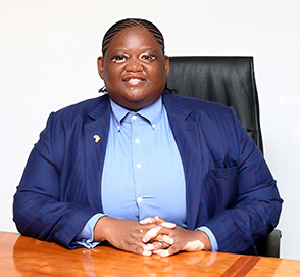

Lwandile Simelane
Studying at Unisa has given Lwandile Simelane, the first vice-president of the South African Sports Confederation and Olympic Committee (SASCOC), the opportunity to continue her academic quest while tending to her busy schedule. She completed an Honours in International Politics in 2016 and is currently enrolled for an LLB.
"Unisa gave me a microscopic view of how much self-discipline I had. It showed me a side of my character that I did not know existed," says Simelane. She says she found that Unisa met all the requirements she had identified to be successful in distance learning. She points out that distance learning does not necessarily mean learning alone, and advises current students to make use of all the assistance that the institution offers.
Simelane was elected to the SASCOC position in 2020. Her involvement in the confederation commenced in 2017, when she was co-opted to the board of SASCOC while serving as vice-president of the South African Hockey Association. She has a long history in the administration of sport. At the age of 18, she was elected as the secretary-general of the International Hockey Federation’s World Youth Hockey Panel. Although she was a keen hockey player, an injury during her first year at university forced her to look at alternative ways to stay involved with sport. "Young people can contribute to the world of sport outside the field of play," she says, "including coaching and umpiring, as technical directors, or, like myself, in sport administration."
Simelane is the chairperson of the SASCOC Gender Commission and is passionate about women and LGBTQIA matters. She believes that the measurement of the success of any sports organisation is whether it cements the future of all people in sport. The environment must be such as to maximise sport achievement. This committee is currently reaching out to other countries to try and establish a model to include transgender athletes.
Another topical issue in sport now is to address the issue of the differences in gender development. She refers to Caster Semenya, who was banned from participating in athletics due to the issue of the difference in her gender development. "This indicates that current measures disproportionally disadvantage female athletes, especially from Africa, more than any other people," she says. "The only women who have been banned from participation have been African female athletes. The Gender Commission is structuring delivery on gender issues, creating an inclusive environment and structuring delivery outputs and measurements for inclusivity at SASCOC."
Simelane is outspoken about leadership and ethical matters surrounding the administration of sport. She believes that a leader should have integrity and ethics, and leave an organisation better than they found it. In South Africa, the administration of sport rests solely on the shoulders of volunteers. All the members of the SASCOC board have other, full-time employment, and volunteer their time to assist in steering SASCOC away from the negative image it had a few years ago. Governance structures and an ethics framework will soon be in place, which will afford the committee the space to focus on the core business of the organisation – being the administration of South African sport – in a very equitable, transparent, and fair manner.
SASCOC is currently conducting post-mortems on all the aspects of the Tokyo 2020 Olympics and Paralympics. Simelane emphasises that the success of the South African athletes cannot only be measured by the medals that came home. Other accomplishments include athletes who achieved their personal best, those who now have a higher ranking in the international sports arena, as well as a number of African records that were broken. Preparation for the Olympics in Paris in 2024 will commence soon, and the lessons learnt from Tokyo 2020 will guide these preparations.
Simelane mentions that the professionalisation of sport is still a burning issue for sport in our country. "South Africa has not opened itself for opportunities for professionalisation of sport," she says, "although it is making a big contribution towards the economy of the country, for example, through sport tourism. Sport can be regarded as a new industry and offers employment in a country desperate for job opportunities." She adds that federations can have better output if athletes did not have to go to work and only have time to train after hours and weekends.
In closing, Simelane has a clear message for Unisa alumni: "We must use the skills learnt at Unisa to be the innovators that encourage adaptability in these changing times. We will have to look at things differently. It cannot be business as usual. Unisa alumni have a lot to contribute towards assisting the university, their communities and the country in adapting to this change."
* By Cilla Boucher, Alumni Relations Officer, Department of Institutional Advancement
Publish date: 2021-10-22 00:00:00.0